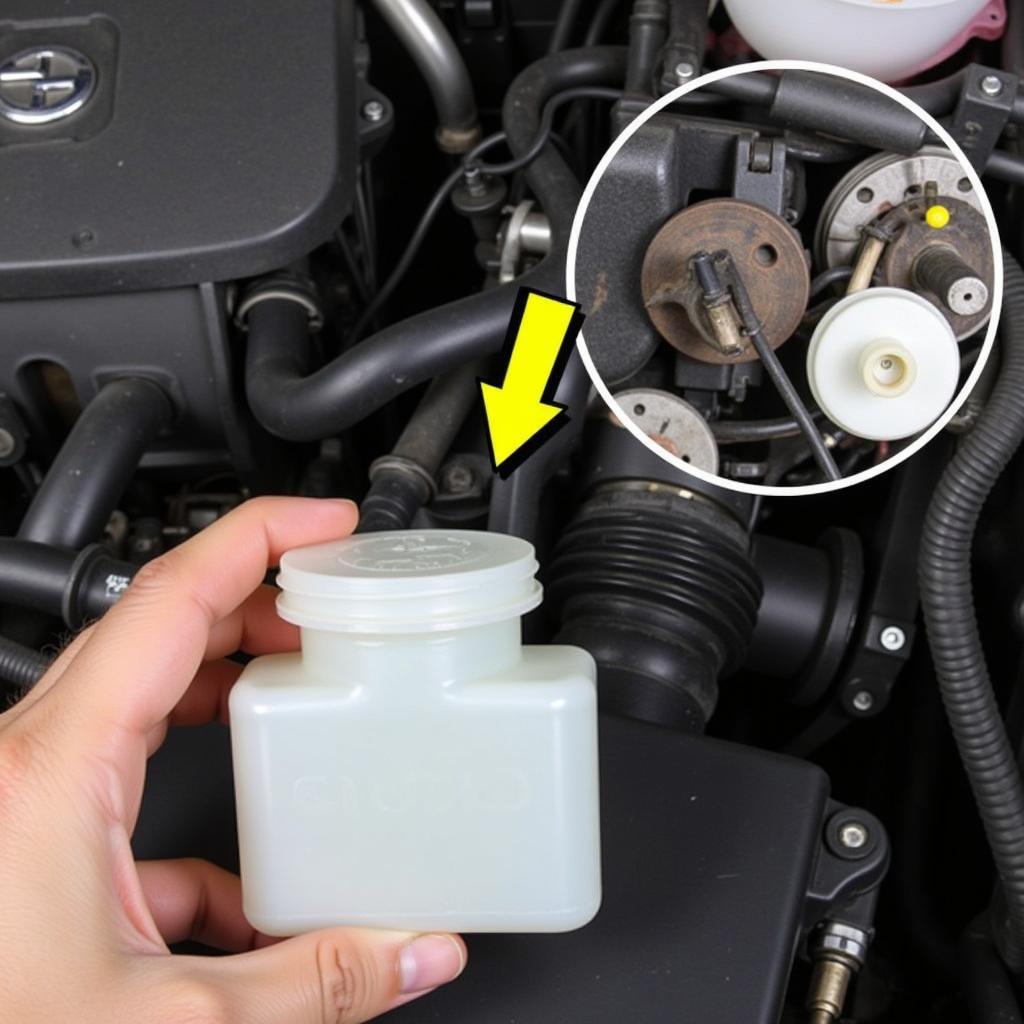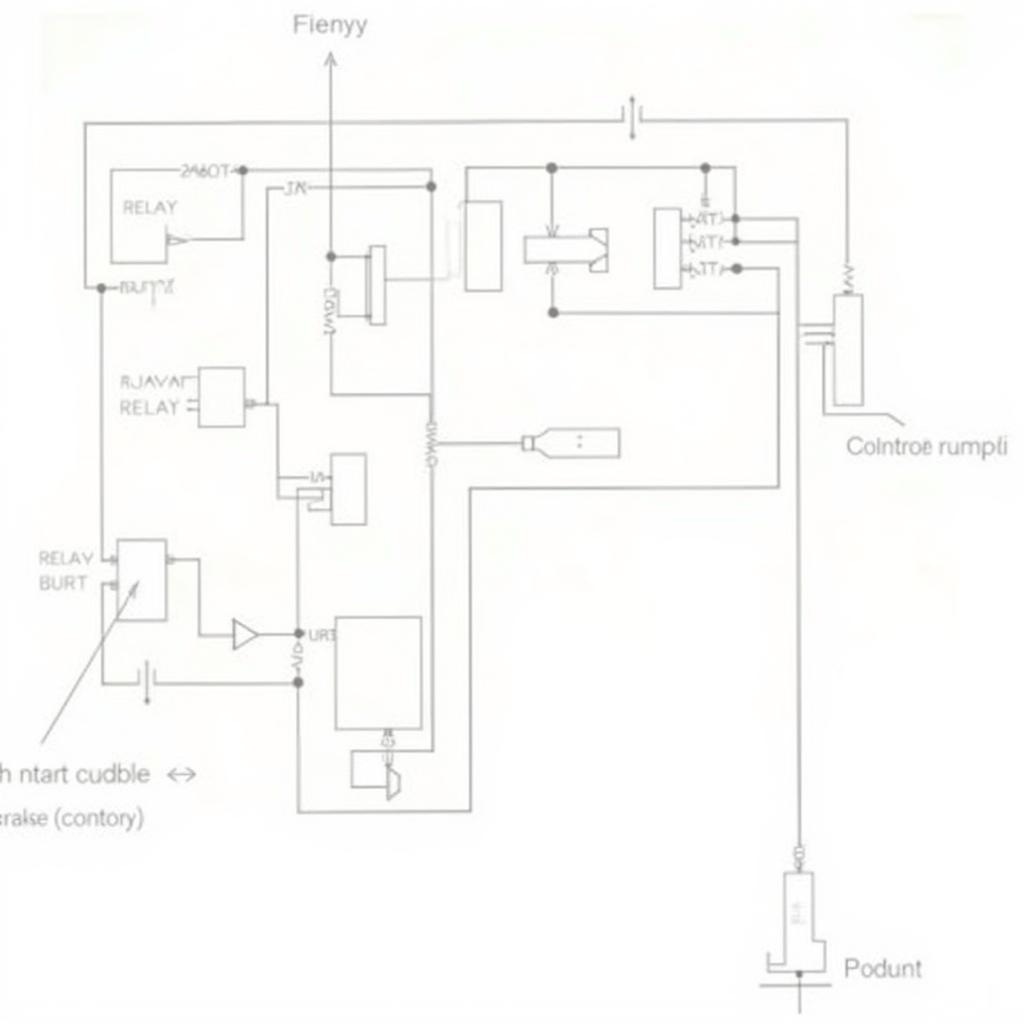A “brake fault” warning light illuminating on your Volkswagen’s dashboard can be a nerve-wracking experience. This warning indicates a problem with your vehicle’s complex braking system, which demands immediate attention. While it’s natural to feel concerned, understanding the potential causes and knowing how to address them can help you stay safe and get back on the road.
This comprehensive guide delves into the common reasons behind the Volkswagen brake fault warning, empowering you to diagnose and potentially resolve the issue.
Decoding the Volkswagen Brake Fault Warning
The brake fault warning light, often accompanied by an audible chime, can manifest in various ways, ranging from a brief flicker to remaining constantly lit. Unlike the regular parking brake warning, which typically displays a “P” symbol, the brake fault warning usually appears as a red exclamation mark within a circle, or the word “BRAKE.”
It’s crucial to remember that a brake fault warning differs significantly from the regular brake pad wear indicator. While worn brake pads necessitate replacement, they usually trigger a dedicated warning light.
Common Causes of a Volkswagen Brake Fault Warning
The intricate network of components within a modern braking system means numerous factors can trigger a brake fault warning. Let’s explore some of the most prevalent culprits:
1. Low Brake Fluid Level
Brake fluid is the lifeblood of your car’s braking system, responsible for transmitting the force you apply to the brake pedal to the wheels. A leak in the brake lines, a worn-out master cylinder, or even worn brake calipers can lead to a drop in brake fluid levels. If the fluid level drops below a critical point, the brake fault warning light will illuminate.
Expert Insight: “Always check your brake fluid level as part of your regular vehicle maintenance. A sudden drop in fluid level is a serious concern that requires immediate professional attention,” advises Mark Stevenson, a senior automotive technician with over 20 years of experience specializing in European cars.
2. Faulty Brake Pad Wear Sensors
Most modern Volkswagens employ brake pad wear sensors, small electrical contacts embedded within the brake pads. As the brake pads wear down, the sensor eventually makes contact with the brake rotor, triggering the brake fault warning light on the dashboard. This system provides a timely reminder to replace your brake pads before they wear down to a dangerous level.
3. ABS System Malfunction
The Anti-lock Braking System (ABS) is a vital safety feature that prevents wheel lockup during hard braking. If the ABS control module detects a problem within the system, such as a faulty wheel speed sensor or a malfunctioning ABS pump, it can trigger the brake fault warning.
4. Issues with Electronic Parking Brake
Many Volkswagen models feature an electronic parking brake (EPB) that replaces the traditional handbrake lever. Problems with the EPB system, such as a faulty switch, a malfunctioning actuator, or software glitches, can also illuminate the brake fault warning.
passat front assist and brake warning lights all on
5. Wiring or Connector Problems
The brake system relies heavily on electrical wiring and connectors to transmit signals between various components. Over time, these connections can become corroded, loose, or damaged, leading to communication errors within the braking system and potentially triggering the brake fault warning.
What to Do When the Volkswagen Brake Fault Warning Appears
If the dreaded brake fault warning flashes or stays lit on your Volkswagen’s dashboard, it’s crucial to take the following steps:
- Pull Over Safely: Find a safe location to park your car away from traffic.
- Check Brake Fluid: Carefully inspect the brake fluid level in the reservoir. If it’s significantly low, do not attempt to drive further.
- Visual Inspection: Look for any visible signs of leaks in the brake lines or around the calipers.
- Seek Professional Help: If you notice a low brake fluid level, leaks, or cannot pinpoint the issue, it’s essential to contact a qualified mechanic immediately.
It’s strongly advised against driving with a persistent brake fault warning. Doing so could compromise your safety and potentially cause further damage to the braking system.
Remote Diagnostics and Software Solutions
In today’s technologically advanced automotive landscape, remote diagnostics and software solutions have become increasingly prevalent in addressing brake fault warnings. Specialized service providers can remotely access your Volkswagen’s onboard computer system to retrieve diagnostic trouble codes (DTCs), providing valuable insights into the root cause of the issue.
jetta sportwagen tdi power steering esp abs warning lights
In some cases, a simple software update or recalibration might be all that’s needed to rectify the problem. These remote solutions offer convenience and efficiency, often eliminating the need for a physical visit to a repair shop.
Expert Insight: “Remote diagnostics can significantly streamline the troubleshooting process, especially for software-related brake system issues,” says Sarah Collins, a certified automotive software engineer specializing in remote diagnostics and programming.
Preventing Future Brake Fault Warnings
Taking proactive measures to maintain your Volkswagen’s braking system can go a long way in preventing future brake fault warnings:
- Regular Brake Fluid Flush: Adhere to the manufacturer’s recommended brake fluid flush intervals.
- Inspect Brake Pads and Rotors: Regularly inspect your brake pads and rotors for wear and tear.
- Address Warning Lights Promptly: Never ignore any warning lights related to your braking system.
- Choose Quality Brake Components: When replacing brake pads, rotors, or other components, opt for high-quality parts from reputable brands.
vw brake warning light flashing
By understanding the potential causes of a Volkswagen brake fault warning and following these preventive measures, you can ensure the longevity and reliability of your car’s braking system, keeping you and your passengers safe on the road.


